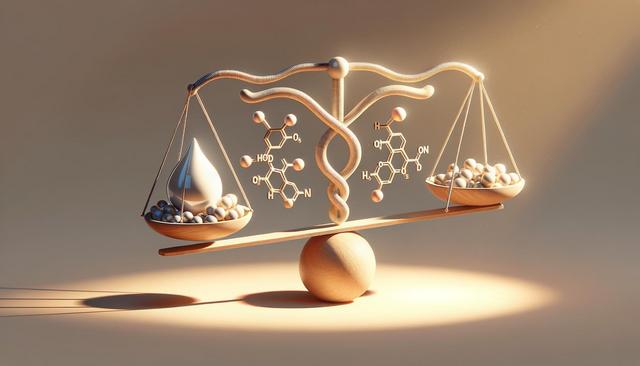What is Hormonal Imbalance?
Hormonal imbalance occurs when there is too much or too little of a hormone in the bloodstream. Hormones play a critical role in regulating most major bodily functions, including metabolism, mood, reproductive health, and sleep. Even small fluctuations in hormone levels can cause noticeable changes in your body. Understanding the signs of hormonal imbalance can help you recognize when something might be off and prompt you to seek professional evaluation.
While both men and women can experience hormonal imbalances, women are more susceptible due to life stages like puberty, pregnancy, and menopause. Some common signs of hormonal imbalance include:
- Unexplained weight gain or loss
- Fatigue or low energy levels
- Mood swings or irritability
- Changes in appetite or digestion
- Irregular or painful menstrual cycles
Recognizing these symptoms early can be key to managing your health more effectively and preventing further complications.
The Role of Estrogen Dominance
Estrogen is one of the primary female sex hormones, but it also plays important roles in men. Estrogen dominance refers to a condition where estrogen levels are disproportionately high compared to other hormones, particularly progesterone. This can lead to a range of symptoms and long-term health implications if left unaddressed.
In women, estrogen dominance may present as:
- Heavy or irregular menstrual periods
- Breast tenderness
- Weight gain, particularly around the hips and waist
- Mood disturbances such as anxiety or depression
- Difficulty sleeping
Estrogen dominance can result from external sources like hormone therapy or internal factors such as obesity or stress. It is essential to evaluate these symptoms in context and discuss them with a healthcare provider to determine appropriate testing and treatment strategies.
Understanding Low Progesterone Symptoms
Progesterone is another key hormone, especially relevant in the context of menstrual health and pregnancy. When progesterone levels drop below optimal levels, it can contribute to a variety of symptoms often mistaken for other conditions. Low progesterone symptoms may overlap with those caused by estrogen dominance, making accurate diagnosis important.
Common low progesterone symptoms include:
- Irregular menstrual cycles
- Difficulty conceiving or maintaining a pregnancy
- Increased anxiety or irritability
- Sleep disturbances
- Premenstrual headaches or migraines
Addressing low progesterone typically involves identifying the root cause, which could include stress, inadequate nutrition, or underlying medical conditions. Lifestyle changes, dietary support, and in some cases, hormone therapy may be suggested depending on individual needs.
Can Hormones Cause Anxiety and Mood Changes?
Hormones have a profound influence on brain chemistry and can significantly affect mood and emotional well-being. For many people, especially women, hormonal fluctuations can lead to increased anxiety, sadness, or even panic attacks. This connection often leads individuals to wonder: can hormones cause anxiety?
The answer is yes—hormones like estrogen, progesterone, and cortisol play a role in regulating neurotransmitters such as serotonin and dopamine, which affect mood. When hormone levels are out of balance, it can disrupt these pathways, leading to symptoms such as:
- Heightened anxiety, especially before menstruation
- Depressive episodes during perimenopause or menopause
- Mood swings and emotional sensitivity
- Sleep issues that worsen mental health symptoms
Understanding the hormonal link behind emotional changes can help in seeking appropriate support, whether through therapy, lifestyle adjustments, or medical treatment. Recognizing that mood instability may have a physiological component can also reduce self-blame and stigma.
Experiencing Perimenopause Without Hot Flashes
Perimenopause is the transitional phase before menopause, marked by fluctuating hormone levels. While hot flashes are a well-known symptom, many individuals experience perimenopause without hot flashes. This can make it more challenging to identify the phase and manage its symptoms appropriately.
Perimenopause without hot flashes may still include symptoms such as:
- Irregular periods or skipped cycles
- Sleep disturbances
- Increased irritability or mood swings
- Fatigue and brain fog
- Decreased libido
The absence of hot flashes doesn’t mean that hormonal changes aren’t occurring. Individuals may still experience shifts in estrogen and progesterone levels, contributing to other subtle but impactful changes. Being aware of these less obvious symptoms can encourage earlier and more targeted interventions.
Conclusion: Navigating Hormonal Health with Awareness
Hormonal imbalances can affect many aspects of your life, from mood and energy to reproductive health and beyond. Understanding the signs of hormonal imbalance, recognizing conditions like estrogen dominance, identifying low progesterone symptoms, and exploring how hormones can cause anxiety enables more informed decisions about your well-being. Additionally, recognizing that perimenopause without hot flashes is possible can help demystify the journey through midlife changes. By staying informed and proactive, you can better advocate for your health and seek the support you need.




Leave a Reply